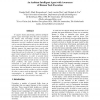Free Online Productivity Tools
i2Speak
i2Symbol
i2OCR
iTex2Img
iWeb2Print
iWeb2Shot
i2Type
iPdf2Split
iPdf2Merge
i2Bopomofo
i2Arabic
i2Style
i2Image
i2PDF
iLatex2Rtf
Sci2ools
IAT
2008
IEEE
2008
IEEE
An Ambient Intelligent Agent with Awareness of Human Task Execution
To support human functioning, ambient intelligent agents require knowledge about the tasks executed by the human. This knowledge includes design-time information like: (i) the goal of a task and (ii) the alternative ways for a human to achieve that goal, as well as run-time information such as the choices made by a human during task execution. In order to provide effective support, the agent must know exactly what steps the human is following. However, if not all steps along the path can be observed, it is possible that the agent cannot uniquely derive which path the human is following. Furthermore, in order to provide timely support, the agent must observe, reason, conclude and support within a limited period of time. To deal with these problems, this paper presents a focusing mechanism to guide and accelerate the reasoning process in concluding the path most likely selected by the human. This mechanism is based upon knowledge about the human and the workflow to perform the task. In ...
Related Content
| Added | 29 May 2010 |
| Updated | 29 May 2010 |
| Type | Conference |
| Year | 2008 |
| Where | IAT |
| Authors | Fiemke Both, Mark Hoogendoorn, Andy van der Mee, Michael de Vos |
Comments (0)

